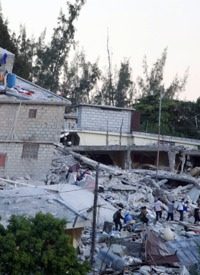
Haiti has long been one of the poorest countries in the Western Hemisphere. Even though it was the first Latin American nation to gain independence — through a slave rebellion — Haitian history has been marked by invasions and occupations to bring down one corrupt regime after another.
Tuesday’s powerful earthquake (measuring over 7.0 on the Richter scale) left much of the country in ruins. Port-au-Prince, Haiti’s capitol, very near the quake’s epicenter, was virtually destroyed. The second floor of the presidential palace collapsed onto the first floor. The Haitian Parliament Building and the National Cathedral, among other places of worship, were demolished. A major hospital collapsed. The World Bank reported that its Haitian offices had been destroyed.
The nation’s infrastructure, which has never been in particularly good shape, is virtually gone. Estimated death tolls range from between 40,000 to 50,000, according to the BBC, to as much as 100,000, according to the Pan American Health Organization. Communications difficulties make it hard to arrive at a precise figure. The International Red Cross estimates that about three million people have been affected by the quake. What we know is that thousands of survivors are without basic necessities such as food and clean water. Damage to the nation’s main seaport and one-runway airport has made it difficult to airlift in relief, meaning that for many Haitians, help will arrive too late. Survivors will doubtless face outbreaks of diseases such as malaria, common in tropical regions with warm, wet climates. Making things worse will be the gangs and looters who come out of the woodwork to exploit tragedies such as this.
George Mason University economist Tyler Cowen speculates that this earthquake has destroyed the country. In his blog Marginal Revolution he asks: “In what sense does Haiti still have a government? How bad will it have to get before the U.N. or U.S. moves in and simply governs the place? How long will this governance last? What will happen to Haiti as a route for the drug trade, the dominant development in the country’s economy over the last fifteen years? What does the new structure of interest groups look like, say five years from now? Is there any scenario in which the survivors, twenty years from now, are better off, compared to the quake never having taken place?”
Actually, there is. As we noted, Haiti gained independence through a slave rebellion. Historians of the region count this as a milestone in the history of peoples of color. Unfortunately, though, the model of governance chosen in the country has followed the collectivism of the French Revolution instead of the individualism that would transform the English-speaking world. Thus Haiti’s vulnerability to exploitation by corrupt and ruthless tyrants such as the Duvaliers. One of the terrible ironies of a country born in a revolt against slavery is that some 225,000 of its children now subsist in slavery due to extreme poverty.
The lesson is an important one: Haiti has remained poor because its people never discovered any philosophy of freedom. One of the reasons the earthquake proved so devastating was the poor construction of many of its buildings. Societies that do not discover freedom, simply never develop an infrastructure capable of withstanding assaults from nature of this magnitude. They never release the natural creativity and enterprise that alone builds strength — whether that strength be found in strong families or resilient buildings or stable infrastructure. Most therefore remain at a subsistence level.
What Haiti needs — in the long run — is to discover this philosophy. Obviously, given present desperate circumstances, that can’t be a priority. People who don’t know where their next meal is coming from cannot be expected to sit around and debate political traditions. Numerous groups are doing what they can to minimize the number of casualties. The millions of dollars in donations to organizations such as the Red Cross from Americans — some possibly struggling with economic woes of their own — demonstrates our inherent generosity.
But Haiti won’t ever prosper from its people simply being given things. Fortunately, the situation in that country will gradually stabilize during the days and weeks ahead. Haitians, having received aid from all over the world, will begin to rebuild. Then, they will have a decision to make. Do they continue as they have in the past? If they continue on unchanged, they will remain poor and possibly dependent on others, and at some point in the future, either another earthquake or some other disaster such as a hurricane will again devastate their population.
Or can a devastated population cease looking with awe — at best — and resentment — at worst — at the fruits of the civilization that saved as many of them as it could? Can members of this population reject political arrangements that have never worked because they only encourage force and end with brutality? Can they embrace the idea of the freedom of the individual, which alone will unleash the creativity and enterprise that will build a new Haiti capable again of standing on its own?
Haitians will need to have this conversation themselves. We can help, but we neither can nor should try to direct it for them. No one, after all, can force a people to embrace freedom.
What will happen over the long run, only time will tell. It should be clear, though, that if Haiti had already been enjoying the economic blessings of liberty when the earthquake struck, the latter’s effects would not have been as devastating. Buildings would have been better constructed, and not as many would have collapsed. The country would have had more resources on hand to respond to the emergency and save more lives.
In the meantime, the Haitian earthquake offers important lessons for us. Americans have largely forgotten the philosophical framework and public mindset that built the capacity to respond to a nation in need. Our schools no longer teach the Declaration of Independence and the U.S. Constitution, much less the freedom philosophy that went into their authorship. Our recent history is a history of lurches leftward, into greater degrees of collectivism. It is fair to say that at least some of our present technological prowess has resulted from a kind of forward momentum in a civilization that once embraced individual freedom and still displays many of its fruits. Many Americans now demand entitlements (healthcare, etc.), but could no more explain what actually produces the wealth that satisfies these demands than could the average Haitian.
Hurricane Katrina, which devastated New Orleans back in 2005, should have shown our vulnerabilities. Whether peoples and cultures embrace individual freedoms and the responsibilities that come with them, or whether they fall into collectivism (or never climbed out of it in the first place), determines whether they rise or stagnate. Both history and the events of this past week show clearly that the collectivism that has dominated the Haitian outlook is a path only to slavery and brutality, and when disaster strikes, to destruction. This is the real tragedy of a country that once gained independence through a slave rebellion.
Photo: AP Images


